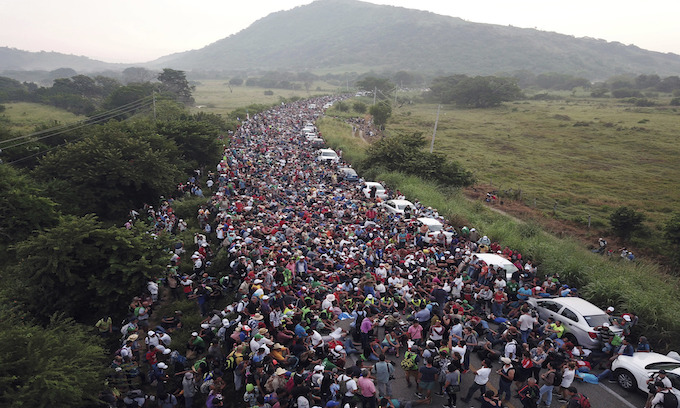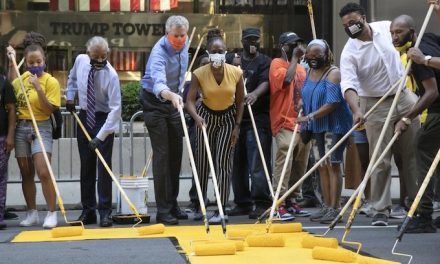Thousands of Cubans have started to join other migrants in caravans heading for the U.S. southern border to apply for political asylum, Cubans in Latin America have told el Nuevo Herald.
From Guyana to Paraguay and Chile, Cuban migrants are posting notes on social networks to join the caravans, which have already created problems in Suriname because of border closures due to the coronavirus. Nearly 500 Cuban migrants, including children and pregnant women, are stranded in campgrounds there.
“I came to this country three years ago with my two children and my husband. I came from Cuba to escape the misery, but we’re in the same situation here. Without work and without assistance, living in a neighborhood with drugs and violence,” Janet Figueroa, one of the members of a caravan in Suriname, told el Nuevo Herald.
Suriname, like Guyana, allows Cubans from the island unrestricted entry, so in recent years the two countries have become jumping-off points for migrants heading for the United States or other countries with large Cuban communities, such as Chile and Uruguay.
Figueroa, 36, is traveling with her husband and two children. She is asking the Guyana government for permission to move on “in search of the American dream.”
“We don’t want to hurt anyone. We only want to get to the United States and join our relatives,” she said. Several cousins in Miami have promised to help her family if they manage to pass the tight requirements for asylum applications along the southern border.
Related Story: Sinema, Kirkpatrick join migrants in calling on Biden to restore asylum access at border
The Suriname government has provided humanitarian assistance to the Cuban migrants and requested technical assistance from the U.N. High Commission for Refugees, the Red Cross and the International Organization for Migration, according to Foreign Minister Albert Ramdin. It has also suspended flights from Cuba and Haiti to keep the crisis from escalating.
An official note from the Cuban government blamed the United States for the migration crisis. Washington provoked the wave of migration, it claimed, when it reduced the number of immigrant and tourism visas it issues each year. Havana said it’s ready to receive all Cuban citizens who want to return to the island voluntarily.
A mysterious affliction that hit U.S. and Canadian diplomats in Havana led the US government to reduce its diplomatic personnel in the Cuban capital by 60 percent and process visa applications in third countries in Latin America. The affliction was likely caused by targeted microwave emissions, according to a recent report by the U.S. National Academy of Science.
The number of non-immigrant visas issued to Cubans plunged from 16,335 in 2017 to 6,959 in 2018 and to 10,167 last year. Immigration visas totaled 7,748 in 2019, according to the U.S. State Department. Washington also suspended the Cuban Family Reunification Program, leaving more than 20,000 families in limbo.
Jorge Duany, who heads the Cuban Research Institute at Florida International University, said a new migration crisis is unlikely even though the island is undergoing a profound economic crisis, an increase in the level of repression and the impact of the Trump administration’s “maximum pressure” policies.
“Since the cancellation of the ‘wet foot dry foot’ policy the United States has deported a growing number of Cubans to their native country,” said Duany.
President Barack Obama eliminated the policy in 2017, which allowed Cubans who set foot on U.S. territory to remain but deported those intercepted at sea. Since then, applications for asylum along the southern border have soared, even though Trump administration restrictions have made it more difficult to win asylum.
“It is expected that the southern borders of the United States, with Mexico and the Caribbean will remain hermetically sealed, at least until the Trump administration hands over power and the situation with the pandemic normalizes,” added Duany, an expert on Cuban issues.
MORE CUBAN CARAVANS IN URUGUAY, CHILE AND PERU
Hundreds of other Cubans are preparing to leave for the United States from Chile, Uruguay and Peru, according to dozens of WhatsApp and other social media posts viewed by el Nuevo Herald and telephone interviews.
José Yans Pérez, a Cuban who has lived in Chile for three years but dreams of living in the United States, is one of the migrants ready to travel through Latin America to reach the US border.
“The situation in Chile has become very difficult. There’s no work, and the process of becoming legal is interminable,” said Perez, who tried to reach the United States from Cuba several times aboard makeshift boats before he emigrated to Chile.
Posts in whatsApp, Facebook and Messenger show the Cubans organizing and detailing the process for applying for political asylum when they reach the U.S. border.
“I’ve been in Chile without papers for two-and-a-half years. Friends have been in the United States for one year and they already have residence. That’s why I am going. I don’t want to stay here, where the Cubans are last,” said Gustavo Cedeño, 46.
“Without papers you can’t work. We also don’t have access to health care, and now they are threatening to deport us to Cuba.”
___
(c)2020 Miami Herald
Visit Miami Herald at www.miamiherald.com
Distributed by Tribune Content Agency, LLC.
—-
This content is published through a licensing agreement with Acquire Media using its NewsEdge technology.



















Well, I guess they can go to CA, or NY
MINE THE ENTIRE bloody border.. NOW!
100 ft wide x 25 ft deep moat filled with alligators (hungry ones) just North of the Trump wall should get what the mines miss. No need for burial squads, not much left when the gators get done.
Why gators. USE PIRANNAH!!!!
Let the Cubans in; they know the evils of collectivism better than our own citizens, and are (literally) dying to be autonomous and self-sufficient. The rest should be admitted or not according to what skills/resources/assets they bring, and their ability to jettison the dependent attitude fostered by whatever Democratic Socialist Republic they are coming from. It is not in the U.S.’ interest to admit people who are itching to become wards of the state; only in the interest of Democrat politicians.
WHEN millions upon millions of AMERICANS, are still struggling to pay bills, WHY THE hell, should we let in ANY FOREIGNER!??
They just couldn’t wait. I bet their relatives started calling once Biden go the nod.
Of course. CAUSE THEY KNOW once they make it in, HE WON”T do anything OTHER THAN Amnesty them all…
You left out welfare, food stamps, free Healthcare, housing, schooling for all the children, etc, etc, etc.
AND In many leftists states, ‘the right to vote’ as well.. ALMOST MAKES YOU WONDER< why so many immigrants do the RIGHT THING AND WORK to become citizens, when every damn benefit of BEING a citizen, these commucrats, KEEP HANDING over on silver platters, to the illegal invaders!
“Without papers you can’t work. We also don’t have access to health care, and now they are threatening to deport us to Cuba.” – Which shows that even Chile is more same than the American Democrat Socialists liberals, who if they had a brain and looked at the way they voted for Trump in Florida would discriminately block them from entering. There goes another million doses of American purchased COVID Vaccine down the socialist sewer, just to keep the Democrat socialist’s scheme of American social conquest on plan.
AND Where’s the democrats WHINING at Chile or other nations, on how “RACIST” They are, in not accepting these illegals. CAUSE THEY WOULD IF IT WAS HERE!
Thousands in South America planning caravans to the U.S. border to seek asylum from Biden
You won’t hear word one from the Liberal Media about them not ‘social distancing’ or not wearing masks as thousands crowd together on the roads.
Yet have a backyard party with a few friends and the Left are sending in Armed Swat Teams.
Let’s see the hypocrites in Nueva Jork and Commiefornia welcome them with open arms when they arrive and not give a care about what contagions they are bringing in with them.
PLUS, whats the bet THEY ALL WILL BE welcomed in, by bidens Border patrol, with OPEN ARMS< free welfare checks, and NO MEDICAL SCREENINGS TO ENSURE they are not carrying in covid or OTHER illnesses!
This is a health crisis just waiting to happen. If Biden has any sense (and since he believes he’ll be the next president) he ought to make an announcement that the border to the US needs to remain closed due to COVID and that no one is going to be allowed in. Biden has made a big deal about how many Americans are dying from COVID, how dangerous it is to be in close quarters, and how we all need to shelter at home to protect our fellow citizens. If he allows these people in he ought to be impeached for endangering the citizens of our country.
Ultimately, I pray that the fraud in this election is uncovered and we escape the disaster of a Biden presidency.
YOU expect this jerk, to have any common sense?? You’d do better, trying to find a snowball in hell.
A Humvee every 500 yards with a GE mini gun and 100,000 rounds of ammo. Flame throwing tanks equidistant between the Humvee’s. That should do it.
How many napalm bombs, do we still have that need to be used (so they don’t get wasted)??
Baitfish, Are you talking on the Mexican border? Or surrounding Wash., D.C.? If we were to escape this crisis by protecting our border, the democrats have hundreds of other crisises to replace this one with. We MUST protect our country from democrat pos by “any means necessary”. Or we can kiss this country bye bye.
I’ say mine field up, around EVERY COMMUCRAT RAN city. AND CEASE making any form of deliveries of ANY SUPPLIES, to those cities..
The democrats will rush them in line of American citizens free,free,. Now that California can count them for votes and representatives, they will be welcomed
ANd all americans still in CA, who cares about you….
What stupidity! They leave their socialist countries to come to our socialist country under Beijing Biden. They are obviously a duped people. They will serve as new useful idiots for the elite.
Here we go again folks! If we the people don’t take this country back, by force, it’s a goner.
An individual, except the President, elected or appointed to an office of honor or profit in the civil service or uniformed services, shall take the following oath: “I do solemnly swear that I will support and defend the Constitution of the United States against all enemies, foreign and domestic; that I will bear true faith and allegiance to the same; that I take this obligation freely, without any mental reservation or purpose of evasion; and that I will well and faithfully discharge the duties of the office on which I am about to enter. So help me God.”
Now that the Supreme Court has refused to “support and defend the Constitution of the United States against all enemies, foreign and domestic” but has instead opened the way for a deceitful man to ascend to the presidency through the felonious acts of his supporters in defiance of federal and state laws or any measure of morality. Such a court has no honor and thus no moral or legal authority. Such a man, installed by such a court, has not been legitimately elected and thus has no honor or authority. As a natural result, chaos and anarchy reigns. The blood from the inevitable conflicts this spawns stains the hands of that corrupt court.
American freedom is in free fall while the pompous elite and Satan, their master, smile.
AND all our elected officials, in the GOP< seem to stand by and do nothing… YEA sure, some signed off on the texas lawsuit, but that was about all they did..